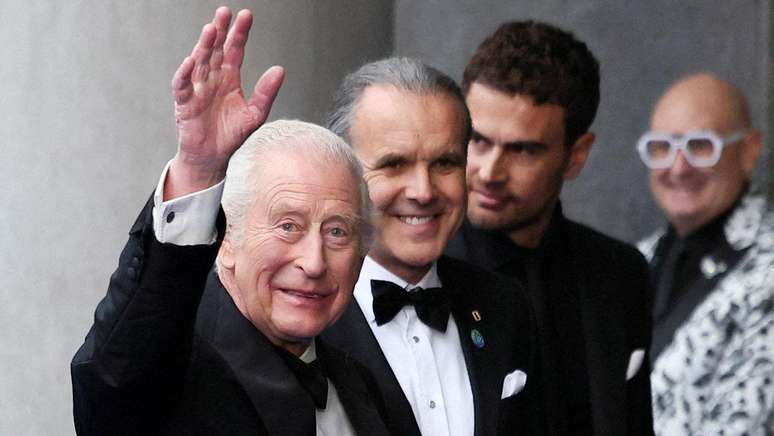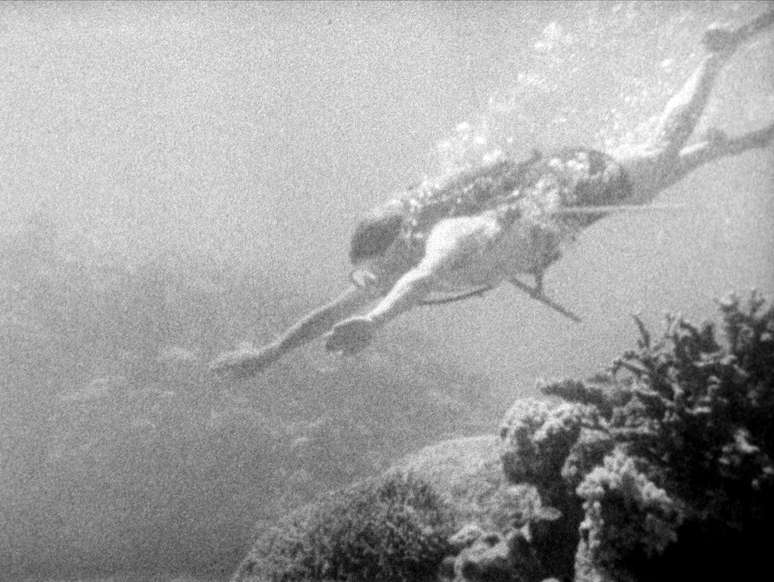David Attenborough's powerful and optimistic message about the future of the planet at 99

David Attenborough, about to turn 99, is releasing what he says is one of the most important films of his career.
The British presenter and naturalist believes the new feature film, Ocean , can play a decisive role in preserving biodiversity and protecting the planet from climate change.
"After almost 100 years on the planet, I now understand that the most important place on Earth is not on land, but in the sea," said David, who turns 99 this Thursday (8/5).
The film argues that the ocean is the planet's lifeblood and humanity's greatest ally against climate catastrophe. And it shows how the world's oceans are at a crossroads.

The blue carpet — not the red — has been rolled out for the film's premiere at London's Royal Festival Hall.
King Charles III was present at the launch, and told David he "couldn't believe" his 99th birthday was on Thursday.
The two posed for photos before entering the auditorium for the screening.
A host of celebrities also attended, including singer Geri Halliwell-Horner, astronaut Chris Peake, singer James Blunt and model Cara Delevingne.
Earlier, Prince William had attended a matinee in a "private capacity" along with hundreds of schoolchildren from across the country.
Toby Nowlan, who produced Ocean , says the new production is not a typical Attenborough film. "It's not about seeing new natural history behaviours. It's the best message he's ever delivered," he says.
The film documents how the world's oceans and our understanding of how they work have changed over David's lifetime.

David remembers his first dive on the Great Barrier Reef in 1957. "I was so overwhelmed by the spectacle before me that I forgot – momentarily – to breathe."
Since then, there has been a catastrophic decline in ocean life around the world. "We are almost out of time," he warns.
Ocean contains some of the most striking images of the damage that bottom trawling — a common fishing practice around the world — can do to the ocean floor. It’s a vivid example of how industrial fishing can drain the life from the world’s oceans, says David.
The new footage shows how the current the vessels drag scours the seabed, forcing the creatures they disturb into the net. They are usually after a single species — and more than three-quarters of what they catch could be discarded.
"It's hard to imagine a more wasteful way to catch fish," says David.
The process also releases large amounts of carbon dioxide, which contributes to global warming, but trawling is not only legal, it is actively encouraged by many governments.
David says the plight of the oceans almost made him lose hope for the future of life on the planet. What stopped him from despairing was what he calls “the most remarkable discovery of all” — that the ocean can “recover faster than we ever imagined.”
David says the story of whales around the world has been a source of enormous optimism for him.
An estimated 2.9 million whales were killed by the whaling industry in the 20th century alone. Scientists say this is the largest slaughter of any animal in history when measured in terms of total biomass. This has driven nearly all whale species to the brink of extinction.
Only 1% of blue whales remained, David recalls: "I remember thinking this was the end. There was no going back, we had lost the big whales."
But in 1986, lawmakers bowed to public pressure and banned commercial whaling around the world. Since then, the whale population has recovered rapidly.
One of the film’s directors, Keith Scholey, has worked with David for 44 years. “When I first met David I was still in nappies,” he jokes. That was in 1981, two years after David had resigned as director of programmes at the BBC – one of the organisation’s most senior roles. “He had already built a career, and was moving on to the next one.”
Despite turning 99, David still has an extraordinary energy, according to Scholey. “Every time you work with David, you learn something new,” he says. “It’s a lot of fun. But on top of that, David keeps you motivated because he’s very driven, so it’s always a very creative process.”
David’s main message in Ocean ’s is that all is not lost. Countries have pledged to protect a third of the world’s oceans. He hopes his new film will encourage world leaders to take firm action on that pledge at a United Nations conference next month.
He believes this can be transformative.
“The ocean can come back to life,” says David. “If left alone, it can not only recover, but thrive beyond anything anyone alive has ever seen.”
A healthier ocean ecosystem would also be able to trap more carbon dioxide, helping to protect the world from climate change, according to scientists.
“We have a chance to protect our climate, our food, our homes,” adds David.
As he celebrates his 99th birthday this week, he is still fighting to protect the natural world he worked his entire life to show us in all its glory.
 BBC News Brasil - All rights reserved. Any type of reproduction without written authorization from BBC News Brasil is prohibited.
BBC News Brasil - All rights reserved. Any type of reproduction without written authorization from BBC News Brasil is prohibited.
terra



